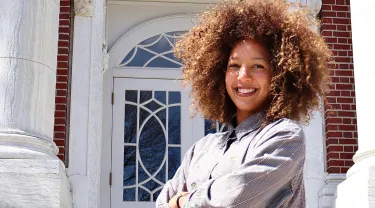Tufts University is preparing tomorrow’s renewable energy leaders through the School of Engineering’s Offshore Wind Energy Engineering program. The first offshore wind graduate program dedicated to infrastructure, supply chain, and transmission, the Tufts offering is meeting the needs of the rapidly growing offshore wind industry.
One industry trend is building more efficient turbines; their blades are larger, and so they sweep more area, capture more wind, and produce more electricity. As an undergraduate at Tufts, Sanoli Boucher, E21, EG23, focused on this trend in one of her capstone projects, researching what it would take to build a testing facility that would be able to handle those larger blades.
As a graduate student, Boucher took her studies further, aiming to become an engineer who can help mitigate the effects of climate change in her home country, the Dominican Republic.
“I am particularly concerned about rising sea levels,” she said. “I was born and raised just three miles from the Caribbean coast. The coconut trees I climbed as a kid are now buried in the sea.”
Since the 2019 launch of the offshore wind energy program, Tufts has placed 100% of its alumni in jobs related to offshore wind power and assembled a thriving research community of more than 20 faculty, Ph.D. students, and postdoctoral scholars, said Eric Hines, program director. Hines is a professor of the practice and Kentaro Tsutsumi Faculty Fellow at the School of Engineering.
Hines projects that the United States needs at least 1,000 engineers a year educated for the next 30 years to be able to meet the nation's goal of carbon neutrality by 2050. According to Hines, the program at Tufts marshals the university’s strengths in collaboration and innovation to help train the needed workforce—and to meet the urgent need to replace fossil fuels.
For Boucher, who now works as an offshore wind project engineer for an international company focused on wind energy, the work involves continuing to fight for the environmental health of the islands she hails from.
“While I no longer live there, I know that what I do in Massachusetts can impact the future of the Dominican Republic, and all island nations, by bringing new ideas to the global climate crisis,” said Boucher. “There are challenges ahead for offshore wind power, but I know that we can do it.”
